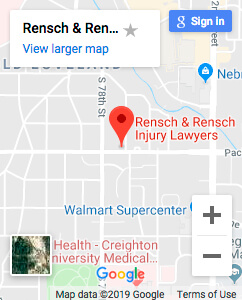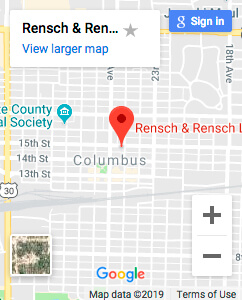Who Can a Plaintiff Sue for a Wrongful Death?
No tragedy compares to the loss of a loved one. This is especially true if the death was the unexpected result of another person’s negligence.
In addition to the stress and emotional hardship, surviving family members may struggle to pay funeral costs and medical bills related to the accident. They may also fall into debt if the victim was a primary source of the family’s income.

Fortunately, surviving spouses, parents and children can file a lawsuit against the person responsible for their loved one’s death. In addition to recovering costs related to the accident, filing a lawsuit may save another person from the same reckless behavior.
At Rensch & Rensch Law, we understand the emotional challenges that accompany these cases. If you have a legitimate claim, an Omaha personal-injury lawyer from our firm will be your on-call legal support. We can answer your questions, address your concerns, and aggressively fight for the maximum compensation. To schedule an appointment, call our office today at 1-800-471-4100.
According to Nebraska Legislature, there may be several defendants in a single wrongful death case. Read on to learn more:
Possible Targets for Wrongful Death Claims
Most wrongful death claims stem from motor vehicle accidents. In these cases, the defendant is usually the negligent driver who allegedly caused the fatal crash.
Depending on the circumstances, though, a plaintiff may also be able to claim against a government employee or agent who did not provide appropriate road hazard warnings. Vehicle manufacturers may also be liable for damages.
Nebraska Wrongful Death Damages
After identifying the liable parties, the next step is determining the loss that you suffered due to the negligent behavior. In Nebraska, plaintiffs can seek compensation for several types of damages. These include economic expenses, such as medical bills and funeral costs, as well as non-economic damages, such as pain and suffering.
Furthermore, if the deceased was a primary source of family income, the plaintiff may be able to claim lost wages, which would include future wages and income benefits.
Calculating these losses is an involved process. While the economic damages may be easy to quantify, determining non-economic damages, such as pain and suffering, is more complicated.
There are several strategies that your attorney may use to calculate pain and suffering damages. One method is multiplying the fixed expenses by a number between one and five. The multiplier that your attorney chooses will depend on several factors, such as the type of accident and the level of reckless behavior involved.
Even if it is clear who caused the death of your loved one, the legal system can be unpredictable. An attorney from Rensch & Rensch Law can evaluate your case to determine if filing a lawsuit would be a smart idea in the first place.
We can guide you through the claims process and fight for the maximum compensation. Call us today at 1-800-471-4100 to schedule a consultation with an Omaha personal-injury attorney.




